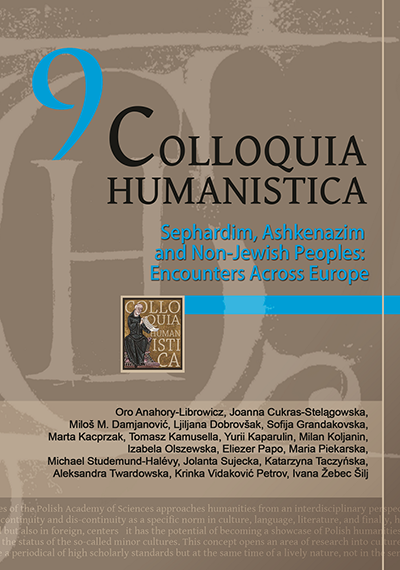Relacje Żydów ze społecznością nieżydowską w Kosowie i Metochii między dwiema wojnami światowymi – od autocentryzmu do asymilacji
Relations among Jews and Gentiles in Kosovo and Metohija between the Two World Wars: From Autocentrism to Assimilation
Author(s): Miloš DamjanovićSubject(s): Jewish studies
Published by: Instytut Slawistyki Polskiej Akademii Nauk
Keywords: Jews; Sephardim; Ashkenazim; Serbs; Albanians; Turks; Romani; Kosovo and Metohija; Kosovska Mitrovica; Priština
Summary/Abstract: The period between the two world wars in Kosovo and Metohija (1918-1941) was a peak period of legal protection, economic development, national and political self-positioning, educational and cultural emancipation, and general progress of the local Jewish community. The local Sephardic community, dedicated to tradition, enriched by the presence of the most progressive Ashkenazi newcomers, and surrounded by the Islamic and Christian majority populations in the private and public arena, strived to access the broader, more general framework of modern societal trends. Encouraged by examples from the immediate surroundings, by the national Yugoslav framework and the more developed Jewish municipalities within the state, through daily and varied interaction with neighbors and institutional contact, a metamorphosis of the local Jewish community was enabled. Internal changes were partially conditioned by intensifying relations with the non-Jewish communities. They mostly accompanied these relations and were their inevitable outcome. Parallel to the development of increasingly diverse and more frequent contacts which were pursued in order to self-develop, to maintain and improve interethnic relations, at the social level there erupted elements of interethnic intolerance based on political, religious or economic grounds. Antisemitism strained and, alongside other factors (internal tightness, popular mentality, national tradition, religious differences), additionally complicated and halted closer cooperation. Besides these disagreements, integration into Yugoslav society was complete, especially among the young generation, but only in extraordinary conditions did it end in assimilation, which was exclusively enabled by the newly arrived Jews coming from other, more open and more cosmopolitan environments. This paper will show and elaborate on numerous examples of private and social collaboration between Kosovo-Metohijan Jews and other nations in the given chronological framework that were, above all, of wider importance for regional development and establishing civilizational heritage.
Journal: Colloquia Humanistica
- Issue Year: 2020
- Issue No: 9
- Page Range: 121-138
- Page Count: 18
- Language: English

